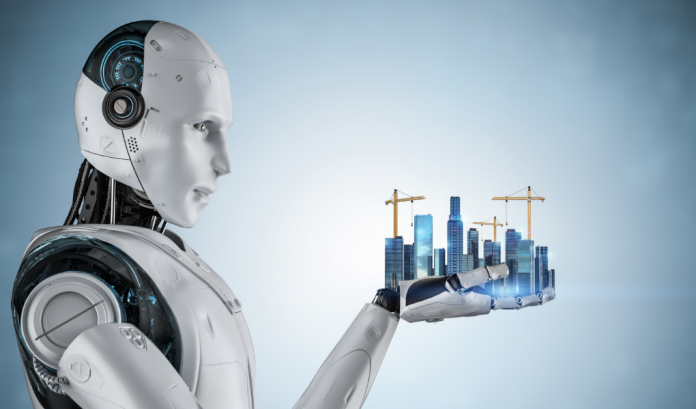The construction industry, traditionally known for its conservative practices, is experiencing a significant transformation thanks to Artificial Intelligence (AI). AI’s extraordinary capabilities are poised to revolutionize various facets of construction, ushering in levels of innovation, efficiency, and productivity never seen before. Leading organizations worldwide are recognizing AI’s transformative potential, supported by compelling statistics highlighting its immense impact.
According to McKinsey, the adoption of AI in construction could generate around $1.6 trillion in value globally, emphasizing its substantial economic influence. Moreover, the World Economic Forum projects that AI technologies could contribute up to $13 trillion to the global economy by 2030, with construction among the sectors set to benefit most.
In terms of productivity, Oxford Economics found that implementing AI in construction could boost productivity by 40%, resulting in shorter project durations, cost reductions, and enhanced project delivery.
Furthermore, AI-powered solutions have the potential to significantly improve safety in construction. The National Safety Council suggests that AI-driven technologies could reduce construction accidents by 20%. Through real-time monitoring, predictive analytics, and risk assessment, construction firms can proactively identify and mitigate potential hazards, preventing accidents before they occur.
As AI continues to evolve, its potential in construction appears boundless. From optimizing project planning and design to automating repetitive tasks and enabling predictive maintenance, AI stands poised to revolutionize the construction industry, driving efficiency, cost-effectiveness, and superior project outcomes.
In this article, we delve deeper into the diverse applications of AI in construction, exploring real-world examples and innovative solutions shaping the industry’s future. By harnessing the power of AI, construction companies can embrace unprecedented possibilities, propelling the industry toward greater productivity and success.
Design Phase:
Generative Design: AI algorithms can generate multiple design alternatives based on input parameters and constraints, enabling architects and designers to explore innovative solutions.
Energy Efficiency Optimization: AI can analyze building designs to optimize energy usage, improve thermal performance, and reduce environmental impact.
Structural Analysis and Optimization: AI algorithms can perform complex structural analysis to optimize building designs for strength, stability, and cost-effectiveness.
Cost Estimation and Budgeting: AI-powered tools can accurately estimate project costs based on design specifications, historical data, and market trends, helping project stakeholders develop realistic budgets.
Sustainable Design and Material Selection: AI can assess the environmental impact of construction materials and recommend sustainable alternatives to minimize carbon footprint and promote green building practices.
Construction Phase:
Construction Site Safety: AI-enabled sensors and cameras can monitor construction sites in real-time, detect safety hazards, and alert workers to potential risks to prevent accidents.
Quality Control and Defect Detection: AI algorithms can analyze construction materials, components, and structures to identify defects, deviations from design specifications, and ensure compliance with quality standards.
Construction Equipment Optimization: AI can optimize the use of construction equipment by analyzing usage patterns, scheduling maintenance, and reducing downtime to maximize productivity.
Construction Progress Monitoring: AI-powered drones and satellite imagery can monitor construction progress, track site activities, and generate progress reports to keep project stakeholders informed.
Material Management and Inventory Optimization: AI can optimize material logistics, track inventory levels, and streamline supply chain operations to minimize waste and reduce costs.
Autonomous Construction Machinery: AI-driven autonomous machinery can perform repetitive tasks, such as excavation, grading, and paving, with precision and efficiency, reducing the need for manual labor and improving productivity.
Operation Phase:
Energy Management and Optimization: AI can analyze building systems, monitor energy consumption patterns, and optimize HVAC, lighting, and other systems for energy efficiency and cost savings.
Predictive Maintenance: AI algorithms can predict equipment failures, schedule maintenance tasks, and prevent costly downtime by monitoring equipment performance and analyzing data in real-time.
Indoor Air Quality Monitoring: AI-powered sensors can monitor indoor air quality parameters, such as temperature, humidity, and air pollutants, to ensure a healthy and comfortable indoor environment.
Occupancy and Space Management: AI can analyze occupancy patterns, space utilization, and user behavior to optimize space allocation, improve workplace efficiency, and enhance user experience.
Security and Surveillance: AI-powered video analytics can enhance security surveillance systems by detecting suspicious activities, unauthorized access, and potential threats in real-time.
Smart Waste Management: AI can optimize waste collection routes, monitor waste bins’ fill levels, and streamline waste disposal processes to reduce costs and minimize environmental impact.
Conclusion
Artificial Intelligence (AI) is revolutionizing the design, construction, and operation phases of building life cycles, ushering in an era of innovation, efficiency, and sustainability. From streamlining design processes and enhancing construction safety to optimizing energy management and predictive maintenance, AI is reshaping the built environment. Leading organizations’ BIM Outsourcing Services AI’s profound impact in each phase, including cost savings, shorter project timelines, improved energy efficiency, heightened safety, and enhanced occupant comfort.
By harnessing AI’s power, the industry is poised to create smarter, more resilient, and sustainable buildings and infrastructure that meet society’s evolving needs. As AI technologies evolve, stakeholders across the construction industry must embrace these transformative solutions and capitalize on their vast potential.
By integrating AI throughout the building life cycle, we can unlock unparalleled levels of efficiency, productivity, and sustainability, shaping a future where our built environment seamlessly aligns with the demands of the modern world.


